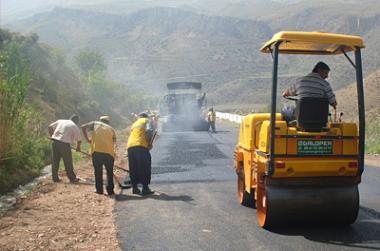Routine Maintenance of Rural Roads through the Concept of Microenterprises: Experience of Peru and Bolivia and its Applicability to Armenia

Summary
The Government of Armenia sought to develop a means of maintaining its roads system to assure sustained access of its rural communities to markets and services. In 2008, it launched the Lifeline Road Network Development Program to stimulate economic growth and contribute to poverty reduction by improving a selected network of lifeline roads. These lifeline roads were mainly rural roads that connected rural communities to a major interstate road. Inability of the Government to adequately maintain those rural roads led to high transport costs and journey times for road users and restricted the connectivity of Armenians to key agricultural markets and important education and health services. These restrictions had a negative impact on the country’s overall competitiveness, prevented economic growth, and failed to contribute to poverty reduction. With limited financing available for routine summer and winter maintenance of the lifeline road networks, the Government turned to exploring alternative methods for preventative road maintenance programs.
To study the successes and challenges of a particular preventative road maintenance policy through microenterprises, the Government of Armenia requested a knowledge exchange with Peru and Bolivia. Both countries had experiences on a national scale for contracting of preventative routine road maintenance to small (micro) enterprises, which have helped the road authorities to sustain routine maintenance efforts and provide vital sources of income to the involved local communities. The Government ultimately wanted to utilize the exchange to learn about the feasibility of developing and implementing a similar system in Armenia.
Participating in the exchange from Armenia were representatives of the national government, including the Ministry of Transport and Communications and Ministry of Territorial Development, as well as regional officials. Providing knowledge in the host countries were representatives from the Ministry of Transport and Communications, Provias Descentralizado (PVD), provincial roads institutes, the University of Huanuco, and several microenterprises in both countries.
The exchange consisted of study visits to Peru on October 25-29, 2014, and then to Bolivia from October 30 to November 2, 2014. During the Peru study visit, participants received presentations from experts on the country’s road maintenance through microenterprises and visited key maintenance sites in Cusco and around Lima. They also discussed such topics as rural decentralization and the roles of the federal and regional government authorities working with the microenterprises. In Bolivia, the Armenian delegation visited road maintenance sites, microenterprises, and local government officials in La Pas, Patacamaya, and Santa Cruz. During this portion of the study visit, they focused on studying and discussing the practical aspects of carrying out routine maintenance of unpaved roads through microenterprises.
The knowledge exchange helped participants recognize some of the challenges of utilizing microenterprises for road maintenance:
- The observance of some of the implementation requirements for such a system would cause several difficulties in the Armenian case. This included factors related to state registration of microenterprises and the organization of microenterprise activities related to financial and tax issues.
- The law on maintenance would need to be changed from it provision that only allows road maintenance units to deliver maintenance services.
- Finally, due to the differences in climatic conditions, there was an issue with winter maintenance, something that is not an issue in Peru and Bolivia. Winter maintenance in Armenia requires heavy snow-cleaning machinery, which defeats the purposes of outsourcing routine maintenance to microenterprises.
The exchange provided enough evidence that led to the decision that the pilot program on road maintenance through microenterprise should not be implemented in Armenia at that time.
Knowledge exchange program such as this can be a useful tool for policy-makers to view reforms and initiatives in other country contexts, allowing them to make informed decisions on whether such reforms or initiatives can or cannot work in their own context.
The exchange received financing from the South-South Knowledge Exchange Facility. Natalya Stankevich, Transport Specialist, World Bank, headed the Bank team during the study tour. Jorge Minaya Osorio, World Bank Consultant, participated from the Peru Country Office.
Providing knowledge in the host countries were the Ministry of Transport and Communications; Provias Descentralizado; the provincial roads institutes; microenterprises in Pucallpa, Tingo Maria, and Huanuco; and the University of Huanuco.
As a result of this exchange, the Government of Armenia recommended to not implement a pilot project on road maintenance using microenterprises at this time but instead will explore other alternative methods of preventative road maintenance more suitable for the Armenian context.
- Karen Gasparyan, Deputy Head of Road Sector, Policy Department of Ministry of Transport and Communication, Republic of Armenia
- Gor Margaryan, Chief Specialists of Road Maintenance and Operation Monitoring, Department of Armenian Roads Directorate (SNCO)
- Karapet Hyusisyan, Chief Specialist of Road Maintenance and Operation Monitoring, Department of Armenian Roads Directorate (SNCO)
- Tigran Janoyan, Head of Tenders and Contracts, Monitoring Department of Transport, PIU State Institution
- Karine Shahbazyan, Financial Manager of Transport, Transport PIU State Institution
- Mauricio Navarro, Transport Specialist, Bolivia Country Office
- Ramiro Cespedes, Interpreter

 China
China Colombia
Colombia Denmark
Denmark India
India Indonesia
Indonesia Mexico
Mexico Russian Federation
Russian Federation Spain
Spain United Kingdom
United Kingdom